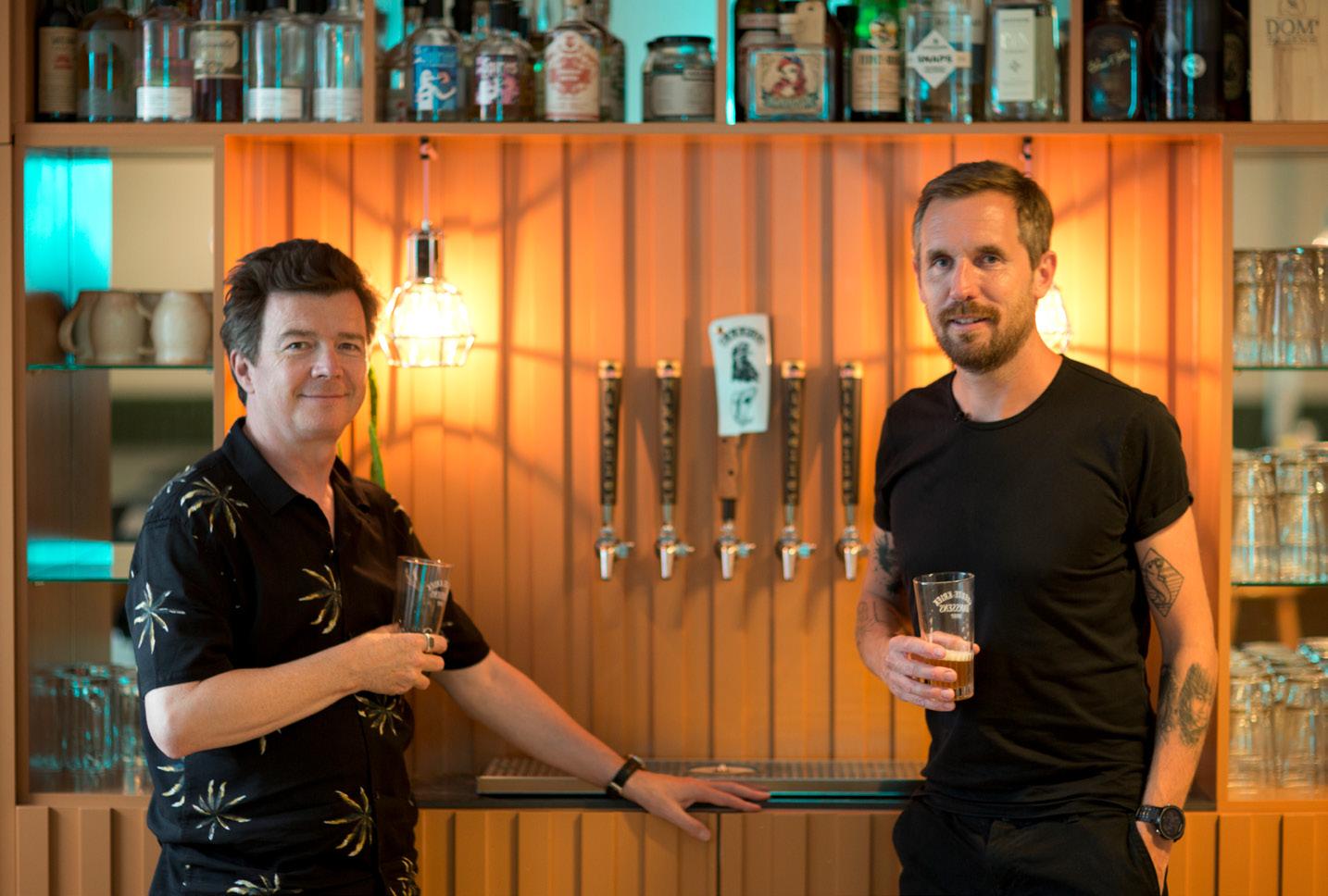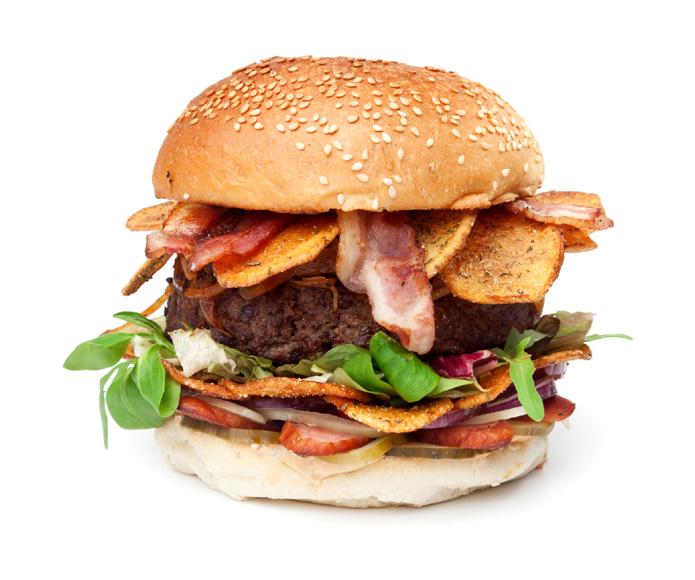
5 minute read
Can Doesn't Mean Should
Bringing a big name to the table isn’t always the home run that it might at first seem.
BY HUGH THOMAS
Advertisement
How do you name a restaurant concept? Best not ask Jack Whitehall. In September 2020, the actor and comedian co-launched his pop-up FoodSlut at Provisioners restaurant near Tower Bridge, leaning into London’s enlightened food scene with ‘super slutty bone marrow gravy’, ‘Slutty Burgers’, and the option to ‘slut it up’ with extra hot sauce.
Food Twitter didn’t quite embrace the idea. ‘Derogatory term for women but making it branding, Jack?’ food writer and editor Helen Graves weighed in. ‘I’m so bored of people confusing being a w***er with being edgy,’ wrote farmer James Whetlor. And my favourite, from broadcaster and Telegraph writer Debora Robertson: ‘Please shut up, close up, and go away you ludicrous child’. These were the more family-friendly responses.
FoodSlut (not to be confused with LA import Eggslut) is one of a spate of celebritybacked entries into the hospitality industry within the last couple years. There’s also Mark Wahlberg’s now defunct Wahlburgers, Lewis Hamilton’s vegan burger chain Neat, and Ed Sheeran’s Bertie Blossoms, which Times critic Marina O’Laughlin described as ‘demented’.
Some are questionable, some may do more harm than good. In an industry already suffering from damaging attitudes towards the women within it, you can see why something with a name like FoodSlut could be problematic. Partly due to a failure to modernise, many restaurant kitchens rely on the brigade system – a hierarchy of prep cooks at the bottom, and exec chefs at the top. As the term suggests, the brigade system was founded on military rank of authority, which doesn’t lend itself well to managing people in already hot, loud, chaotic kitchens.
Women are more often on the receiving end than men. Stories – at least, the ones that are reported – include: staff making bets on who can make the new girl chef cry first; choosing not to wear skirts or dresses to disincentivise guests from getting handsy; a chef hitting a female member of staff almost daily, ‘leaving their mark’ on them; male staff watching female staff while they change clothes or shower after a shift. Surveys tell us these cases are being reported more and more in recent years.
‘Hopefully,’ FoodSlut co-founder Marcus Petty-Saphon tells me, ‘people understand we are using it in a way to describe a certain type of food and not to cause offence.’ I hope the risk they took was worth it.
Risk, though, is certainly part of the equation when expanding your brand into new areas. Celebrities may realise it late, but some sort of emotional investment matters most. ‘I have nothing against celebs opening up bars and restaurants,’ Goya Communications’ Sara Al-Ali tells me. ‘But, say, when footballers open restaurants, it tends to be style over substance, and lacking in soul.’
Perhaps you see it in your industry – celebrities dipping their toes in when they don’t know the temperature of the water. Before she founded hospitality communications firm Tonic, Frances Cottrell-Duffield worked in fashion and sport PR. She recalls a model who wrote a cookbook. ‘But that was a passion project – not just putting her name to something. There are these exceptions, but the biggest issue with celebritybacked ventures is they have another life, and this as a side hustle is hard to get a good quota of your time or longterm vision.’
In many cases, a ‘sleb-injected venture ‘introduces’ a concept already flogged shirtless by someone else, just with a recognisable name holding it together. With its dude food pastiche, FoodSlut didn’t come to the party with anything new. But then again, maybe that’s okay.
Because, through luck or good judgement, FoodSlut’s pop-up arrived between national lockdowns – a juncture when people were craving the comfort of sloppy burgers, fries by the trough, and carby blankets of ragu pappardelle. Foods like this stir up memories of simpler, safer times. Or at least when we weren’t in the middle of job losses, life losses, and an economic crisis. One study notes that, during lockdown, Brits’ consumption of ‘tasty treats’ – if you’ll pardon the vagarity of the term – was up 34 per cent.
As a pop-up, something like FoodSlut isn’t intended to last beyond a few weeks. I remember, from early in my food journalism career, a chef telling me: ‘If your restaurant’s gone three years in London, you’ve done well.’ Throw a celebrity’s name in there randomly, and expectations might have to be lowered. ‘I never think with something like this that there’s longevity,’ Cottrell-Duffield says.
RICK ASTLEY AND MIKKEL BORG BJERGSØ RAISE A GLASS TO A SUCCESSFUL CELEBRITY INTERVENTION.
Even in hospitality though, one does come around every now and then. In 2018, Rick Astley opened a pub in Shoreditch with Danish indie brewery Mikkeller. A bit gimmicky, yes, but the singer claimed their portfolio had helped him fall back in love with beer, and even ended up brewing a ‘Northern’ lager with them. The same year, rapper Loyle Carner teamed up with Street Feast and British Street Food as part of his mission to teach kids with ADHD how to cook. Having grown up with the condition, and an affection for cooking, he appreciates culinary energy sometimes needs a bit of guidance.
There’s that emotional investment I was talking about. James Blunt’s restoration of Chelsea’s The Fox & Pheasant, which is on the Campaign for Real Ale’s list of historically significant pub interiors, is another one. 16 years his own local, Blunt bought the building before pub company turned real estate hoarders Greene King could sell it off, likely to an offshore property developer wanting to turn it into unaffordable flats.
In Blunt’s case, his fame is fairly irrelevant – though what it did to his bank account certainly helped – to the general group his pub serves. To enter into new territory, to present to new audiences, on little else but the thin promise of a recognisable name. Hear me out, but it reminds me of a famous line from Jurassic Park: When certain people are – to reappropriate Jeff Goldblum’s quote – “so preoccupied with whether or not they can, they don’t stop to think if they should.”
Hugh writes about food and beer and has contributed to Time Out, Great British Chefs, Zagat, and many more besides. hughlthomas.com










